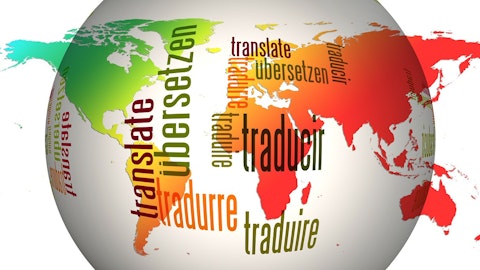In this article, we will take a look at the 5 hardest languages to learn for English speakers. If you wish to learn more, head straight to the 16 Hardest Languages To Learn For English Speakers.
5. Korean
Insider Monkey Score: 4
Korean, spoken by 80 million people, features the logical writing system Hangul. While Hangul is easy to learn, English speakers may need help with Korean due to word order and complex sounds. Spelling involves 19 consonants and 21 vowels designed to resemble mouth shapes. Vocabulary presents difficulties, as a large portion is derived from Chinese.
Korean grammar, similar to Japanese, involves changing particles, measuring words, tenses, honorifics, and complex verb conjugation. Speaking and listening require unique mastering sounds, while grammar complexity lies in sentence variations. Mastering Korean necessitates dedicated effort and comprehension of its linguistic structures.
4. Japanese
Insider Monkey Score: 4
Japanese, spoken by 128 million people in Japan, is considered one of the most challenging languages for English speakers. Its complex writing system, including tens of thousands of characters called “kanji,” and the emphasis on respectful speech pose significant difficulties. Vocabulary differs significantly from English; grammar introduces unfamiliar concepts such as measure words, particles, and honorifics. While pronunciation aligns with English for the most part, mastering Japanese requires dedicated effort due to its intricate writing system and grammar.
3. Mandarin
Insider Monkey Score: 4
Mandarin Chinese, spoken by 918 million native speakers and 199 million non-native speakers, is a highly valuable language to learn for English speakers despite its difficulty. It is tonal, with four tones that can change the meaning of words. The written form uses thousands of complex characters without directly connecting to pronunciation. While grammar is simpler than in Indo-European languages, understanding Mandarin’s syntax and mastering its extensive writing system requires significant effort.
2. Arabic
Insider Monkey Score: 4
Arabic, a Semitic language spoken in the Middle East and northern Africa, presents challenges for English speakers. Its right-to-left script, complex grammar, and unfamiliar sounds make it super hard to learn. Arabic includes Modern Standard Arabic for print and media and various regional dialects. Pronunciation is difficult due to back-of-the-mouth consonants.
The Arabic script, derived from the Phoenicians, features shape-changing letters and right-to-left reading. Grammar differs from English, with plural forms and irregular verbs. Despite the challenges, learning Arabic offers cultural insights and career prospects.
1. Hungarian
Insider Monkey Score: 4
Hungarian is a challenging Uralic language spoken in Hungary, known for its complex grammar and pronunciation. With 14 vowels and unique consonant clusters, English speakers find reading and pronouncing Hungarian challenging. However, its expressive nature, descriptive words without English equivalents, and gender-neutral characteristics make it a fascinating language.
Hungarian’s flexible sentence structure, based on possession, tense, and number suffixes, adds another layer of complexity. Bilingual proficiency in Hungarian provides a competitive advantage in the job market, as companies seek professionals who can engage with Hungarian-speaking stakeholders.
Insider Monkey focuses on uncovering the best investment ideas of hedge funds and insiders. Please subscribe to our daily free enewsletter to get the latest investment ideas from hedge funds’ investor letters by entering your email address below. You can also take a peak at the 25 Most Boring Jobs That Pay $100,00 or More and the 15 Big Companies That Aren’t Profitable.





